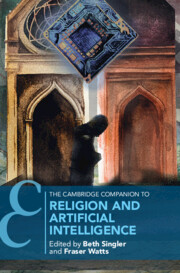Book contents
- The Cambridge Companion to Religion and Artificial Intelligence
- Cambridge Companions to Religion
- The Cambridge Companion to Religion and Artificial Intelligence
- Copyright page
- Contents
- Contributors
- Acknowledgements
- 1 Introduction
- 2 Steps towards Android Intelligence
- Part I Religions and AI
- 3 Hinduism and Artificial Intelligence
- 4 The Buddha in AI/Robotics
- 5 Artificial Intelligence and Jewish Thought
- 6 Artificial Intelligence and Christianity
- 7 Islam and Artificial Intelligence
- Part II Social and Moral Issues
- Part III Religious Studies
- Bibliography
- Index
- Cambridge Companions to Religion (continued from page ii)
- References
5 - Artificial Intelligence and Jewish Thought
from Part I - Religions and AI
Published online by Cambridge University Press: 20 November 2024
- The Cambridge Companion to Religion and Artificial Intelligence
- Cambridge Companions to Religion
- The Cambridge Companion to Religion and Artificial Intelligence
- Copyright page
- Contents
- Contributors
- Acknowledgements
- 1 Introduction
- 2 Steps towards Android Intelligence
- Part I Religions and AI
- 3 Hinduism and Artificial Intelligence
- 4 The Buddha in AI/Robotics
- 5 Artificial Intelligence and Jewish Thought
- 6 Artificial Intelligence and Christianity
- 7 Islam and Artificial Intelligence
- Part II Social and Moral Issues
- Part III Religious Studies
- Bibliography
- Index
- Cambridge Companions to Religion (continued from page ii)
- References
Summary
This chapter comprehensively lays out all the possible ways that artificial intelligence (AI) might interact with Jewish sources as their relationship develops over the next many years. It divides the scope of the relationship into three parts. First, it engages with questions of moral agency and their potential interactions with Jewish law, and suggests that this path, while enticing, may not be particularly fruitful. Second, it suggests that Jewish historical sources generally distinguish human value from human uniqueness, and that there is therefore quite a bit of room to think of an AI as a person, if we so choose, without damaging the value of human beings. Finally, it considers how Jewish thought might respond to AI as a new height of human innovation, and how the human–AI relationship shares many characteristics with the God–human relationship as imagined in Jewish sources.
- Type
- Chapter
- Information
- Publisher: Cambridge University PressPrint publication year: 2024

